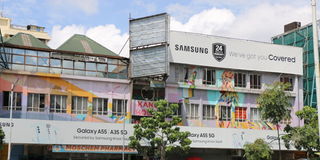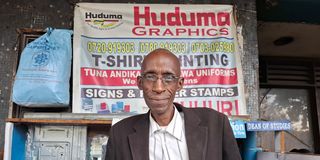Why auction of Kanu house will erase part of Nakuru's political history

A street view of Kanu house building in Nakuru city.
Kanu house is among the long-standing buildings in Nakuru City.
Unfortunately, the landmark that bears the city’s and country’s history is now facing auction, with the bid currently standing at over Sh. 70 million.
It is general knowledge that Kanu house once hosted the office of Kenya’s second president, Daniel Arap Moi, during his time in and out of office and has been an integral part of Nakuru’s political history.
According to Musa Githinji, a graphics designer for over four decades in the city, the building was once owned by Geoffrey Kamau, the first mayor immediately after independence.

Musa Githinji, a graphics designer in Nakuru city poses for a photo during an interview on November 6, 2024.
This was before the then-mayor decided to sell it to the political party.
“Things went smoothly in the past in that house. I witnessed the late President Moi visit it often and use it as his office. Over the years, I was shocked to find that they had turned it into business stalls. Now it is being sold- its name will be forgotten,” Githinji says sadly.
Different generations have grown up with different notions about the building that represent the roots of the town’s growth and the legacy of the Moi era.
Politicians have often used the site as a meeting point during rallies and public events, while a younger generation knows it as a major landmark point to meet in town before proceeding on to other activities.
However, with its imminent future, it begs the question- what does this mean for the people of Nakuru?
For Githinji, while its monetary value may not decline, he dejectedly notes that its name might disappear.
“The historical value of Kanu house will slip through our fingers and become a thing of the past. This is also largely because the political party historically associated with the building, which was a key base for Moi, has lost much of its relevance,” he says.
Githinji adds that the political party affiliated with the house is on its deathbed and feels like its value might be forgotten because so many people have left that party.
“It’s no longer the centre of power it once was, and many people no longer identify with it.”
Now, Githinji believes that there is a time for everything, and despite his and the public’s lamentation, he’s hopeful that the businesses that continue to set up in Nakuru’s landmark will boost the county’s economy.
Even when it gets a new owner, Kanu house will remain to be known as one of the oldest buildings in the city alongside Gituamba and the cinema theatres that came up during the colonial period.

